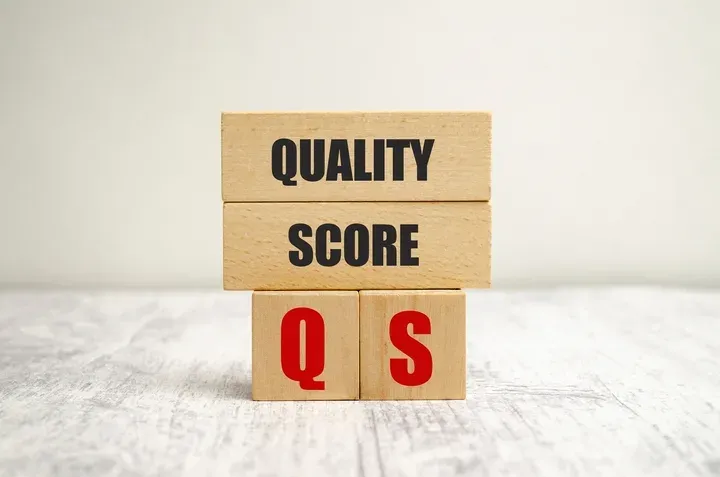Google Ads are crucial for online businesses, with over 80% using them for advertising. They boast an average 3.52% click-through rate (CTR) across industries.
Furthermore, the use of display ads has been shown to potentially increase web traffic by up to 300%.
This article explores the importance of the Quality Score in measuring the success of your Google Ads campaign.
What Is Quality Score in Google Ads?
Google Ads' Quality Score is a metric that rates your ad's quality compared to competitors. The score is calculated each time your ad appears in a search.
The metric scores your keywords from 1 to 10, with higher scores indicating greater relevance of your keywords to your ads, landing page, and customers.
What Is a Good Quality Score for Google Ads
Before we get into what each keyword Quality Score means for your ads, keep in mind that they are not linear - a score of 6 isn't twice as good as 3.
Let's look at what each level quality score represents:
A Quality Score of 1-3
The lowest scores (1-2) are considered poor, and ads with these scores often don't get displayed.
A Quality Score of 4-6
A score of 4-6 is seen by Google as average, indicating your ad quality is standard.
A Quality Score of 7-8
Good quality.
A Quality Score of 9-10
Highest possible score, considered great.
How to Check Keyword Quality Scores in Google Ads

Follow these step-by-step instructions to check your Quality Score in Google Ads:
Step #1: Log into your Google Ads account.
Step #2: Find and click on the Keywords icon in the left menu.
Step #3: Next, click on the Columns icon in the right upper corner of the table.
Step #4:
To check your Quality Score and its components, click the Quality Score icon under "Modify columns for keywords."
You can add any of these options to your statistics table.
- Quality Score
- Landing Page Exp.
- Exp. CTR
- Ad relevance
Step #5:
For a deeper analysis beyond Quality Score statistics, consider these options:
- Historical Quality Score
- Historical Landing Page Exp.
- Historical Ad Relevance
- Historical Exp. CTR
Step #6:
After performing all the changes and analyses you want, click on the Apply icon.
How Is Google Quality Score Calculated
Google's Quality Score calculation is based on three key components:
Expected CTR (Click-Through Rate): The most crucial factor, it predicts the relevance of your ads to users by estimating the number of clicks an ad is likely to receive. Higher CTR signifies greater relevance.
Ad Relevance: This assesses the correlation between your ad and user search queries. Increasing ad relevance involves incorporating the targeted keyword frequently.
Landing Page Experience: Evaluates the relevance and usefulness of your landing page to users who click on your ad, considering factors like loading times.
Quality Score calculations in Google also incorporate some extra components:
Account History: Google considers all aspects of your account, including changes made. Recent account history is given more weight, encouraging frequent updates.
Keyword Relevance: Your chosen keyword should be present in your ad title, ad copy, URL, and throughout your website to ensure visibility in relevant searches.
Ad Text Relevance: The text in your ads must include the targeted keywords to achieve a higher Quality Score and appear in relevant searches.
How to Improve Your Quality Score in Google Ads

Improving your Quality Score in Google Ad is vital for ranking in relevant searches and reducing your overall cost per click.
You can do so, by following these methods:
Research New Keywords: Regularly update your keyword list to stay aligned with relevant content, enhancing traffic and relevancy in Google searches.
Organize Your Keywords: Group your keywords to better match them with specific ad campaigns, increasing their relevance.
Improve Your Ad Text: Enhance the relevance and targeting of your ads for different ad groups to boost Click-Through Rate (CTR) and effectiveness.
Optimize Your Landing Page: Make your landing pages fit each ad group better to improve user experience.
Exclude Negative Keywords: Continuously review and remove irrelevant keywords, reallocating your budget to new, relevant keywords.
How Organic and Paid Search Strategies Influence Quality Score
Understanding the interplay between organic and paid search is crucial for an effective online marketing strategy.
Using insights from organic searches, like top-performing keywords, can enhance Google Ads strategies.
In the same breath, aligning your messages in organic and paid content increases credibility and trust, refining user experience across platforms.
High visibility in organic and paid searches significantly boosts brand recognition, impacting ad click-through rates.
It’s also important that your budget for paid search is informed by organic search performance.
In the long run, SEO improvements contribute to a higher Quality Score, hence the importance of relevant content, and a user-friendly website.
Common Mistakes That Lower Your Quality Score and How to Avoid Them
| Mistake | Solution | |
|---|---|---|
| Ignoring Keyword Relevance | Using irrelevant or overly broad keywords | Conduct detailed keyword research and select terms closely aligned with your ad content and audience's search intent. |
| Neglecting Ad Copy Quality | Writing poor or irrelevant ad copy, lowering CTR. | Create compelling, relevant ad copy that includes target keywords and clearly states your value proposition. |
| Overlooking Landing Page Experience | Having a slow, unresponsive, or irrelevant landing page. | Ensure your landing pages are fast, mobile-friendly, and content-relevant. |
| Not Using Relevant Keywords | Not excluding irrelevant search terms, leading to unwanted clicks and wasted budget. | Regularly refine your negative keyword list to filter out unfit terms. |
| Forgetting about Ad Extensions | Not using ad extensions, missing potential CTR improvement. | Incorporate relevant ad extensions like site links and callouts for better information and visibility. |
| Inconsistent Ad Groups | Mixing too many varied keywords in one ad group. | Organize ad groups with closely related keywords for better ad-keyword relevance. |
| Ignoring Geographic Targeting | Targeting too broad a geographic area, resulting in irrelevant impressions. | Use geographic targeting to focus ads where your target customers are. |
Takeaway
Achieving a high Quality Score in Google Ads can significantly boost your business, landing you at the top of Google SERPs, reducing costs, and increasing your click-through rate..
This not only draws in more customers, expanding your customer base and revenues, but also improves your overall campaign performance.
Rather than focusing solely on improving the Quality Score, aim for broader campaign improvements. This approach will naturally elevate your Quality Score in Google Ads.
Frequently Asked Questions
How will I know how many people visited my site?
A number of different third-party resources allow you to see how many people visited your site.
How customizable is my ecommerce store?
This depends on the eCommerce tool you use. For example, Magento is 100% customizable, and you can amend just about every aspect. Shopify on the other hand has far fewer customization options.
Can I use hosting for WordPress for an ecommerce site?
Yes, of course. In fact, the platform has some of the best online stores and a range of payment processor plugins on the market.
What is the difference between Google ad rank and Quality Score?
Quality Score is Google's measure of your ads and landing pages' user experience based on relevant keywords. A higher score leads to lower Cost-Per-Click (CPC) and better Ad Rank.
How long before a website appears in Google?
According to Google, it usually takes a few days to several weeks for them to crawl and index a new page, depending on various factors.

I've been navigating the web hosting waters for years now. As the Chief Editor at Verpex, I team up with some awesome writers to dish out the good stuff on hosting. Got a Master's in Journalism, so I always have an eye out for quality. Whether you're just dipping your toes or you're a seasoned surfer, I'm here to make everything web hosting feel like a breeze
View all posts by Julia Lozanov



















